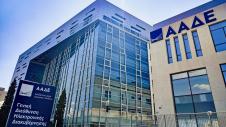Greece's non-performing loan (NPL) market is heating up after the shock caused by the pandemic, which led to the postponement or cancellation of relevant transactions, raising doubts about whether banks will be able to implement the large securitizations that have been scheduled.
The risk of plans being derailed that aim at reducing non-performing loans through the mega-securitizations promoted by systemic banks, combined with fears about a new generation of bad debt being created, were the main reasons that raised concerns about the health of Greek banks, leading to a sharp drop in bank shares on the Athens Stock Exchange.
Bank officials point out to Business Daily that market conditions have changed dramatically in the last few months. In recent weeks, optimism has returned, and the restarting of the economy, the so-called reopening optimism, has led to a rapid return to normalcy with investors focusing on upcoming improvements in bank figures rather than the severe problems caused by the pandemic.
Optimism improved on the back of the massive liquidity programs implemented by central banks in the United States and Europe, as well as many other countries, in addition to the large-scale fiscal intervention programs delivered by countries around the world aimed at stimulating economies.
This stream of liquidity river is estimated to reduce the effects of the recession in 2020 and accelerate recovery in 2021, reviving investment expectations.
Markets have not only stabilized but in Europe and the US they have recovered most of the losses caused by the coronavirus and the investment appetite is not only improving for stocks and bonds but all categories of investment. In fact, some investment groups want to speed up the completion of agreements in a bid to take advantage of discounts due to the special conditions.
NPE market heats up
It is no coincidence that at the end of May, Alpha Bank announced the resumption of the investment process for the securitization of Galaxy, which may exceed 10 billion euros, amounting to one of the largest NPE transactions in Europe. At the same time, the management of Piraeus Bank stated, during the presentation of first-quarter earnings, that it is in talks with investors on two major securitizations totaling 7 billion euros.
According to sources, investor interest is strong. Alpha Bank officials have held dozens of teleconference calls with investors on the Galaxy project and the sale of CEPAL and investor interest is solid. The restoration of visibility has allowed Alpha Bank's management to predict that the transactions will be completed by the end of the year.
The return to normalcy was confirmed by the completion of Eurobank's transactions with doValue, which included the large 7.5 billion euro Cairo securitization, as well as the sale of 80 percent of the group's loan management unit, FPS. There were several reports of the deal being canceled due to the pandemic, though both sides denied this. With the completion of the two transactions, Eurobank's NPL ratio has fallen to 15.6 percent with the bank leading the way in Greece on tackling bad debts.
At the same time, National Bank announced the sale of the Icon project, amounting to 1.6 billion euros in unpaid capital terms, to Bain, with the lender postponing until the end of the year major securitization plans.
Bad bank plans
Bank officials point out to Business Daily that the big advantage of government guarantees is that under certain conditions, the cost is attractive with the CDS being the most important. All systemic banks expect to move ahead with securitizations through the "Hercules" plan.
However, even if all goes well and the securitizations are completed successfully, banks will be left with a large stockpile of non-performing loans, based on European standards, which they will have to deal with by using other tools.
Bank officials note that the Bank of Greece's plan to create a bad bank could lead to a definitive solution to the problem of bad loans, while also addressing the issue of deferred tax credits.
However, the Bank of Greece has many more reasons to implement the plan to create a single bad bank, with the main one being that things may not go as well as we hope. The main danger, not only for banks but also for the country and the global economy in general, is the worsening of the pandemic in winter, in what would result in the cancelation of loan securitizations.
The central bank believes that the country and the banking system must be prepared for any eventuality and that there must be tools available to address the deteriorating situation on the non-performing loan front. In this context, the central bank emphasizes that the plan for the bad bank will provide for its voluntary use by banks and that it will operate in addition to other tools.
YIANNIS PAPADOGIANNIS









